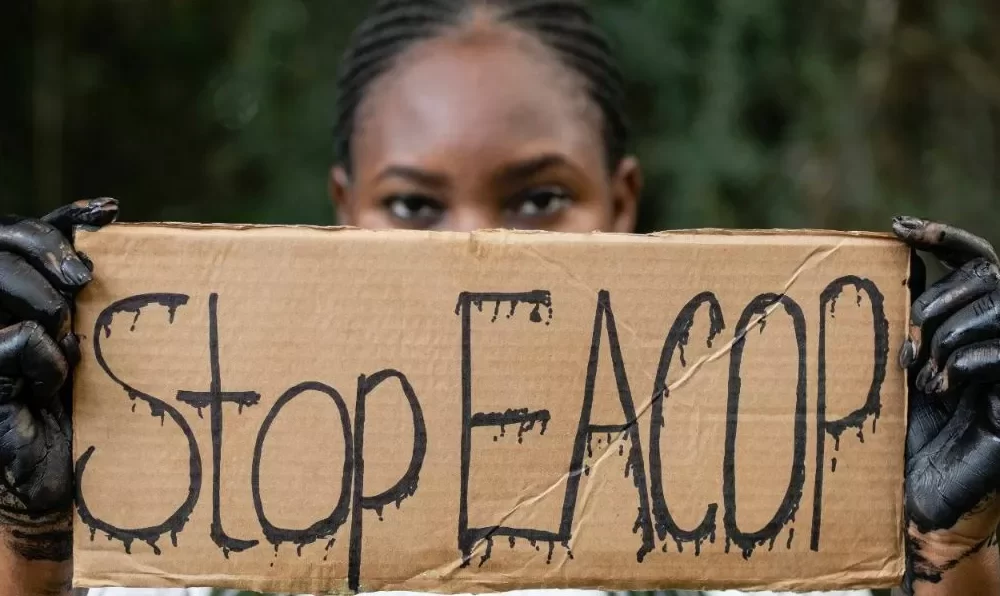MEDIA FOR CHANGE NETWORK
Well connected: The resistance against the fossil industry in East Africa.
Published
11 months agoon
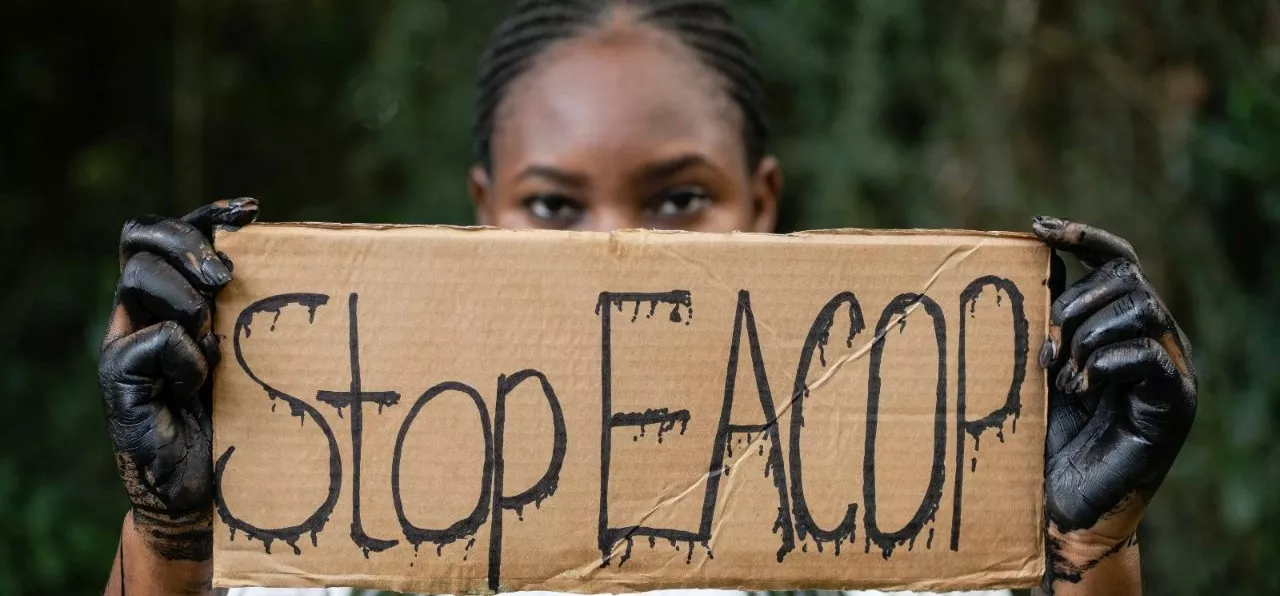
Uganda and Tanzania have created facts about the promotion of the fossil industry by launch on the construction of the East African crude oil pipeline. At the same time, the internationally networked resistance of civilian actors towards the booming oil production in East Africa is growing. Judicial complaints are a central element in their fight to uphold the rule of law, human rights and environmental protection.
Last year, the beginning of the end of the fossil era was ushered in at the world climate conference in Dubai. Some countries interpret this as follows: it is necessary to get the last fossil fuels out of the ground. This means drilling, dredging, pumping – to earn crude oil, gas and coal once again.
One example is the fossil industry in Uganda, which is trying to feed its last fossil occurrences from the ground into the global economy. It wants to pump the petroleum down there to the surface and through a heated pipeline into a deep-sea port into the Tanzanian tanga. From there, it, together with the French energy giant TotalEnergies and Chinese participation, is being shipped for the global oil industry.
The oil project called the East African Crude Oil Pipeline (EACOP) with a targeted running time of 25 years has been under construction since this April. In Tanzania and Uganda, the scope of civilian actors who are fighting against land seizures for the 1,443-kilometre-long pipeline corridor and defending human rights is severely restricted. In Uganda, the police have arrested farmers, journalists, human rights and environmental defenders who have spoken out against the oil projects. Reporters Without Borders once again stated in May that freedom of the press and civil say are strictly curtailed. At the end of May, eight environmental activists were arrested when a letter of protest to the Chinese Embassy was arrested by Ugandan security forces. Obviously, governments sacrifice freedom of expression, human rights and livelihoods for their fossil utopianism.
Bizarre oil shops
Uganda’s government is not only pursuing an export strategy for its crude oil, which is stored in the Albertgraben on the border with the DR Congo. It also wants to modify its own oil import infrastructure. For this purpose, Ugandan President Yoweri Museveni initiated an old oil dispute with Kenya: In February, the neighbouring countries decided to resume the plan to expand the Mombasa-Eldoret-Kampala pipeline. This pipeline originates in the port of Mombasa/Kenya, on the Indian Ocean and currently leads via Nairobi to Eldoret in West Kenya. This part has been in operation since May 2014. For many years, plans to extend the pipeline have been circulating, first to Kampala on Lake Victoria, Ugandan, then on to Rwanda’s capital Kigali, possibly even to Lake Bujumbura Burundi around Lake Tanganyika.
This would mean that on the one hand, the export of crude oil is being produced, while at the same time the import of refined oil will be extended. This contradicts any economic logic that the finishing of a product is not outsourced as far as possible. While Uganda wants to transport its crude oil via the East African crude pipeleline EACOP to the port to Tanga and sell it from there on the world market, from Mombasa, 130 kilometres north of Tanga, refined oil via the Mombasa Eldoret pipeline to Kampala is to be pumped at the same time.
On the one hand, crude oil transport for the world market, on the other hand, import of refined oil – that is, of fishing-for fuels – for one’s own energy needs: this is an old pattern for asymmetric trade relations – or, as the Kenyan climate activist Omar Elawi said: business colonialism. Others will benefit from the refinement of the crude oil and transport. The oil, transported twice over thousands of kilometres, puts a heavy impact on the environment and undermines the social development of the adjacent municipalities. The economic dependence of the Global South is simply reproduced in terms of trade policy. And climate policy, the EACOP is also a disaster that undermines the fair energy transition in Uganda.
Problems and protest on the spot …
It is therefore not surprising that the sharpest critics of EACOP include many regional environmental and human rights defenders as well as initiatives affected. For example, Witness Radio Uganda documents land veins on an interactive map and has been providing legal assistance to people in rural areas affected by land expulsion for years. Tonny Katende from Witness Radio says: “We combine legal assistance and media work to mobilize the rural population. This is the only way she can protest with a strong voice against the injustices in land use and environmental destruction and advocate for equal access to resources in our country.”
Another activist is Christopher Opio, founder of the Oil Refinery Residents Association (ORRA). The NGO with over 7,000 members recently protested before the Court in Hoima in Western Uganda. This is where the pipeline is to start, and 42 households have recently been sued by the government, because they refused to accept compensation for their country: “This means that these people are now being driven out of their country,” said Opio. At the protest on the 15th April the landowners moved through the city towards court. They hold signs high with messages such as “Do not attach our rights” and “do not self-elige us for oil”.
TotalEnergies has been drilling in Tilenga on the northern shore of Lake Albert on Lake Albert since June 2023. Four hundred holes are planned, one third of which are in a natural park. In the Kingfisher area further south of the lake, the Chinese company CNCOOC is taking hold to light since January 2023. Fishing communities of both places turn to the companies with a protest letter in April 2024: the light from the drilling rigs violates and distributes the fish, and nitrogen- and phosphorous-containing wastewater is burdening the water quality. The risks documented by international environmental organizations such as Les Amis de la Terre, Natural Justice and Greenpeace, as well as Human Rights Watch and BankTrack, are concerned about water and the health of over eleven million residents at Lake Albert: 426 wells ensure that water is pumped from Lake Lake Lake. The water is then heavily heavy metal and poses a threat to the population as wastewater. A leak would be a disaster for which no one is sufficiently prepared.
… and anti-imperial rhetoric of the revolt
Local civilian actors in Tanzania and Uganda, including lawyers, students and stakeholders, are often discredited by their own governments as an extended arm of imperial Western environmental extremists. An environmental journalist and a community worker temporarily left the country for persecution and intimidation.
Governments sacrifice the environment for their fossil utopianism
Activism does not arise from a capitalist lobby, but scientifically proven risks to the environment, dangers to the health of neighbouring communities, concrete human rights violations such as land displacements and expropriations, and de facto violent attacks by the police and the military – including rape and massive bodily injury to the rural population. On the basis of research and witness reports, problems are combated, such as the inadequate compensation of the oil lobby or the authoritarian behavior of the project operators. Here the anti-imperial rhetoric of the government side is like a diversionary manoeuvre.
The Chinese CNCOOC and TotalEnergies are now feeling resistance from all over the world in addition to the local protest. This is the international (instead of imperial) dimension of the debate. More than 260 civil society organisations are demanding a stop from EACOP. The political forms of action and protest of the well-connected movement against the construction of the EACOP are manifold: an important lever is legal complaints against violations by companies and governments. Another strategy is divestment. Potential investors or insurance companies should be persuaded not to invest in environmentally harmful and anti-social projects, or to deduct their capital from such projects.
Complained, divestment and political pressure
In November 2020, four East African civil society organisations, including AFIEGO, Natural Justice Kenya and the Tanzanian Strategic Litigation Centre (SLC), filed a complaint against EACOP at the East African Court (EACJ). After an initial dismissal, the Appeals Division of the East African Court requested the plaintiffs at the beginning of the year, until 22. March submit written comments. By the end of April, the defendants were again allowed to react to them in writing. The civilian plaintiffs see legal principles violated by the state, including the environmental and human rights standards enshrined in the Treaty of East African Community for the benefit of current and future generations, as well as compliance with international treaties.
The consortium of lawsuits is an expression of a regionally and internationally well-connected NGO community, which takes legal action against the fossil fuels, including its financial and reinsurance companies, through legal action. This means that among the global civilian NGO networks is growing know-how to strategies for how to take several tracks against the land grabbing of the climate-damaging fossil industry. With the worldwide campaign “StopEACOP, 29 investors have now been discouraged to be part of the pipeline project, including the second largest German insurance group Talanx.
In the fight against the large-scale fossil-fuel project EACOP, the strategy of divestment is considered promising, especially in Europe: Public pressure on the suppliers from the construction, insurance, logistics and credit institutions sectors is to prevent the cash flow for the project, which is still not financially secured. Another great success of the international campaign alliance “StopEACOP” was the withdrawal of the Japanese Sumitomo Mitsui Financial Group over a year ago. Meanwhile, 27 banks and 23 reinsurers as well as four export credit agencies have announced that they will not support EACOP. Therefore the mood on the Instagram account of the campaign alliance is sometimes euphoric.
The political pressure was also some success. International alliances confront politicians with studies such as “A Disaster in the Making” by Les Amis de la Terre or “Our Trust is Broken” by Human Rights Watch 2023. The European Parliament called on the governments of Uganda and Tanzania to comply with human rights standards in September 2022. In a decision on the COP27 climate conference, the German Bundestag spoke out against the financing of the EACOP in 2022.
Do the climate complain?
Lucien Limacher from the organisation Natural Justice from South Africa, one of the members of the plaintiffs against the EACOP before the East African Court, generally likes the effects of climate lawsuits. On the one hand, climate lawsuits are also increasing on the African continent. However, Limacher also says: “In the global North there is a misunderstanding about how we define climate processes. Africa will suffer massively from the consequences when global warming of more than 2.5 degrees is suffering.” In addition, in view of the 400 to 600 fossil projects that are up to 400 to 600, the climate cannot be saved solely through the route of the process. “So we need to think about how we proceed in legal disputes. A new way of thinking is emerging on the African continent: local climate lawsuits are no longer just about emissions, but about much more comprehensive risk factors such as access to food and water or land, because these areas that will be most severely affected.”
Despite the manifold resistance, the further construction of the EACOP is also progressing – and thus Uganda’s desire to become part of the ranks of the petrostate, half of which cover their economy from oil business. After the exit of European and Japanese banks from EACOP financing, the French energy giant TotalEnergies has signed a contract with China Petroleum Pipeline Engineering (CPP) for the construction and supply of line pipes. This means that the cross-border project has been relocated to Beijing, from where most of the still missing loans are likely to come from. During the recent visit of China’s head of state Xi Jinping to France in early May, there was no public talk of the oil shipping in Uganda. It is hardly conceivable that Macron and Xi of all people can silence the issue, because the resistance against the EACOP is great, especially in France.
The struggles for oil production in Uganda, with the words of the Ugandan anthropologist Paddy Kinyeras 1, show that pipelines as critical infrastructures represent physical manifestations of power geometry. The realization of the pipeline requires governmental power and strengthens it at the same time. Since the Paris Climate Agreement, the World Climate Summits have been a place to publicly confront this government and corporate power and to create political back pressure against the fossil industry. They also serve as an international networking area for the civilian actors.
At the end of 2024, after the United Arab Emirates in 2023, a fossil heavyweight will once again host the World Climate Summit: Azerbaijan. And thus for the third time in a row a country that plans to rely on fossil resources and revive oil and gas production before the agreed phasing-out. Once again, the summit will be headed by a long-standing employee of an oil company, Muchtar Babaiev. He is the Minister for the Environment of a host country that has little understanding for civilian engagement. It is not very promising to take place against the charged fossil lobby. This is one reason upon all, internationally networked environmental, research and human rights initiatives in the fossil industry. They are essential to open the oil business with protests, climate lawsuits, divestment campaigns and political pressure.
Source: www.iz3w.org
Related posts:
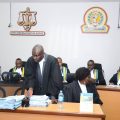
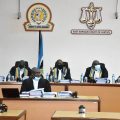 East African Court of Justice is to decide whether it has jurisdiction to try the EACOP case filed by Four East African NGOs today.
East African Court of Justice is to decide whether it has jurisdiction to try the EACOP case filed by Four East African NGOs today.
 A reference filed by CSOs against the planned construction of the East African Crude Oil Pipeline (EACOP) is set for hearing.
A reference filed by CSOs against the planned construction of the East African Crude Oil Pipeline (EACOP) is set for hearing.
 The East African Court of Justice fixes the ruling date for a petition challenging the EACOP project.
The East African Court of Justice fixes the ruling date for a petition challenging the EACOP project.
 Appellate Division of the East African Court of Justice (EACJ) to hear an Appeal filed by CSOs which seeks to reinstate a petition against the construction of the EACOP project tomorrow.
Appellate Division of the East African Court of Justice (EACJ) to hear an Appeal filed by CSOs which seeks to reinstate a petition against the construction of the EACOP project tomorrow.

You may like
MEDIA FOR CHANGE NETWORK
Uganda’s top Lands Ministry official has been arrested and charged with Corruption and Abuse of Office, a significant event that will have far-reaching implications for land governance in the country.
Published
1 day agoon
June 6, 2025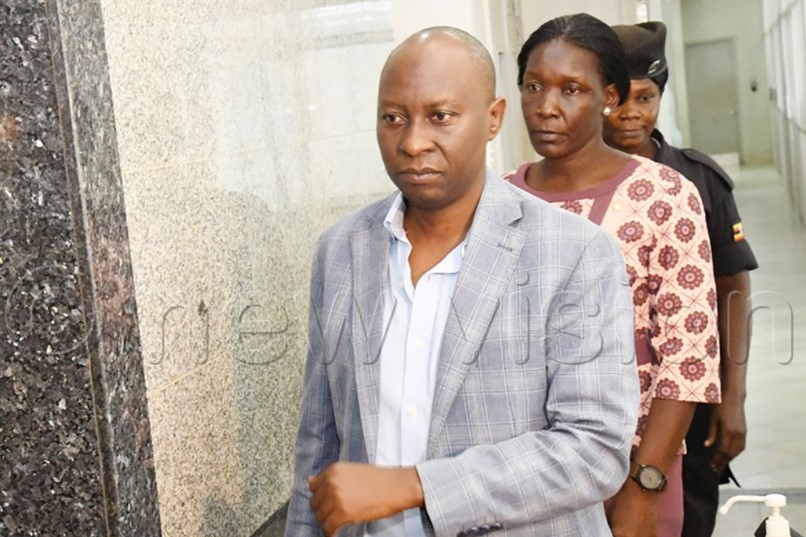
By Witness Radio team.
Kampala, Uganda – The commissioner of Land Registration from Uganda’s Ministry of Lands Housing and Urban Development, Mr. Baker Mugaino, has been arrested and charged before the Anti-Corruption Court, Witness Radio has learned.
Mugaino was arrested by officers from the Office of the Inspectorate of Government (IG) on Wednesday, June 4th, and arraigned before the Anti-Corruption Court, where he was charged with corruption and abuse of office. He pleaded not guilty before Chief Magistrate Rachael Nakyaze.
This development confirms findings from numerous reports and investigations by Witness Radio, a leading watchdog for land and environmental rights in Uganda. Witness Radio, through its extensive research and investigative work, has been at the forefront of uncovering systemic corruption and the misuse of authority, particularly within Uganda’s land administration institutions, which continue to fuel land-related injustices, especially against vulnerable and impoverished communities.
The arrest comes at a critical time when the country is experiencing a surge in land grabs, many of which are tied to fraudulent land dealings, title cancellations, double titling, and land transfers facilitated by compromised officials. This is an urgent situation that demands immediate attention and action.
In one of its reports released in 2024, focusing on forced evictions and emerging trends in Uganda, Witness Radio called on the Government of Uganda to address rampant corruption and abuse of power by those in authority, particularly in land registries, the Uganda Police Force, and the army combined with favoritism towards the wealthy at the expense of the poor. This call for government accountability is crucial to ensure transparency and fairness in land administration.
According to the prosecution, Mugaino, in his role as the commissioner of land registration at the Ministry of Lands, unlawfully canceled land titles on April 8 and 20, 2024, which had previously been issued to Tropical Bank Ltd, Akugizibwe Gerald Mugera, and Namayiba Park Hotel. This action, if proven, could have severe financial and social implications for these entities, potentially leading to significant losses and disruptions.
In addition, Mugaino failed to perform his duties as provided for in Section 85 of the Land Act, Cap 236, and his duties as Commissioner of Land Registration.
The center of contention arises from the land located at Kibuga Block 12, Plots 658, 659, and 665 in Kisenyi; Kibuga Block 4, Plot 152 in Namirembe; and Kyadondo Block 244, Plot 2506, in Uganda’s capital Kampala. These are prime locations that have been subject to numerous land disputes, making Mugaino’s actions particularly significant.
Under Section 87 of the Penal Code Cap 120, Mugaino will face imprisonment for a term not exceeding seven years if convicted and dismissed from public service.
Witness Radio commends the government for taking action against one of its own, recognizing it as a necessary and hopeful step toward addressing the root causes of land evictions and fraudulent land dealings.
Speaking in response to the recent arrest of the Commissioner for Land Registration, Witness Radio’s Team leader, Jeff Wokulira Ssebaggala, emphasized that most land grabs, illegal evictions, and fraudulent land dealings are orchestrated from within government offices by individuals entrusted with public authority.
“It is time for the government to prosecute its own, those whose continued abuse and misuse of public office have directly fueled widespread land injustices.” Mr. Ssebaggala added.
Related posts:

 An early bird: oil-affected communities have launched a petition to the Lands Ministry, seeking protection of their rights in the face of forced acquisitions.
An early bird: oil-affected communities have launched a petition to the Lands Ministry, seeking protection of their rights in the face of forced acquisitions.
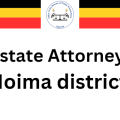 Persecution: The prosecutor’s office is turned into a tool to harass locals for opposing land grabs to give way to the oil project in Mid Western Uganda.
Persecution: The prosecutor’s office is turned into a tool to harass locals for opposing land grabs to give way to the oil project in Mid Western Uganda.
 State House Anti-Corruption Unit nets a surveyor implicated in Mubende district land-grabs
State House Anti-Corruption Unit nets a surveyor implicated in Mubende district land-grabs
 394,000 Land Titles Affected By Closure Of Ministry Of Lands Offices In Wakiso
394,000 Land Titles Affected By Closure Of Ministry Of Lands Offices In Wakiso
MEDIA FOR CHANGE NETWORK
Environmentalists raise red flags over plan to expand oil palm fields in Kalangala
Published
3 days agoon
June 4, 2025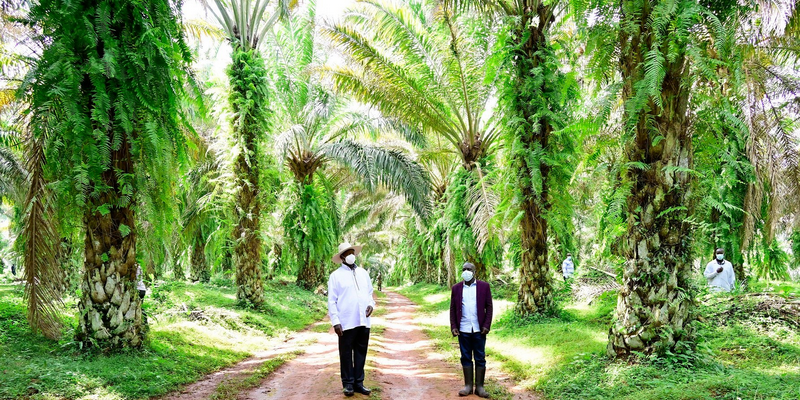
President Museveni inspects an oil palm plantation owned by Mr Deogratious Ssesanga, a model farmer in Kalangala District on May 26, 2023. PHOTO/PPU
Environmentalists have raised fresh concerns over the ongoing expansion of oil palm fields in other parts of Kalangala District, warning that it will degrade the ecosystem in the area.
The expansion follows a 2023 directive by President Museveni, allowing oil palm cultivation beyond Kalangala’s main island of Buggala. The initiative targets over 700 acres on Serinya Island, 600 acres on Lulamba, and 1,500 acres on Bukasa Island. Additional land on Bugaba, Bufumira, Buyovu, and Funve islands is also being earmarked for oil palm cultivation.
Environmentalists say this move contradicts earlier safeguards aimed at preserving the ecological integrity of other islands in Kalangala.
The district comprises 84 islands but only 64 are inhabited.
Mr Joseph Byaruhanga, the Kalangala District environmental officer, said the original Environmental and Social Impact Assessment (ESIA) recommended limiting oil palm to Buggala to protect the natural forests and promote food crop diversity elsewhere.
“The intent was to preserve the natural forests on other islands and maintain food crop cultivation,” Byaruhanga explained in an interview on June 3.
Oil palm cultivation in Kalangala began in 2006, primarily on mailo land. Currently, over 12,000 hectares are under cultivation, including land managed by smallholder farmers and Oil Palm Uganda Limited (OPUL).
Records at the Kalangala District Environment Office indicate that forest cover has plummeted from 57 per cent in 1954 to just 22 per cent currently. The primary drivers of deforestation include rice farming (20 per cent), oil palm growing (18 per cent), and a combination of timber harvesting, settlement, and charcoal burning (16 per cent).
“The economic benefits are pushing residents to clear more land for oil palm, but this has long-term consequences—sedimentation, pollution, and even increased lake accidents and windstorms due to changing weather patterns,” Byaruhanga warned.
“Kalangala is surrounded by shallow waters. Without vegetation to anchor the soil, siltation could gradually fill the lake. If oil palm must expand, then we need a parallel forest restoration programme.” he added.
Mr David Kureeba, a senior programme officer Forests , Biodiversity and Climate Change at National Association of Professional Environmentalists (Nape) cautioned that unregulated oil palm expansion is a looming environmental disaster in the island district . “Although oil palm is a tree-like crop, it does not replicate the ecological functions of natural forests,” he explained.
“Oil palm trees may live for 25 years, but they are no match for indigenous forests. Natural forests are biodiversity hubs with wide canopies, climbing plants, and complex ecosystems,” he added.
Mr Kureeba also noted that forest cover clearance releases greenhouse gases like methane and carbon dioxide, exacerbating global warming. “Methane alone contributes to nearly a quarter of global climate change impacts. Destroying forests releases these gases into the atmosphere,” he said.
“Forests also regulate climate through evapotranspiration, contributing to cloud formation and rainfall. The morning dew and fresh air we enjoy come from forests. Without them, even moisture exchange through leaf stomata disappears,” he further explained.
Mr Frank Muramuzi, NAPE Executive Director, emphasised Kalangala’s vulnerability due to its island geography.
“Clearing forests removes natural windbreaks, exposing the area to strong winds and dangerous weather patterns like tornadoes,” he said.
“Oil palm doesn’t absorb as much carbon dioxide or release as much oxygen as broadleaf trees. Replacing forests with oil palm only worsens the problem,” he added.
Mr Muramuzi also criticised Uganda’s EIA process. “Developers often conduct their own assessments, which tend to downplay environmental risks in favour of economic benefits,” he said.
Despite these concerns, project proponents insist the expansion is being handled responsibly.
Mr Boaz Zaake, an agronomist with Ssese Oil Palm Growers Cooperative Society Limited ( SOPAGCO), said farmers are using cover crops and maintaining buffer zones to prevent erosion and water pollution.
He also argued that most of the targeted land for new oil palm fields was previously abandoned due to tsetse fly infestations and not part of any protected forests.
“All national forests have been preserved. Oil palm trees do produce oxygen just like other trees,” he said.
Mr Muramuzi, however, dismissed this claim, arguing that oil palm trees contribute little to climate regulation.
“Oil palm isn’t a real tree in ecological terms. It has a small leaf surface and limited capacity for carbon capture. Unlike broadleaf indigenous trees, it offers minimal environmental benefits,” he said.
Kalangala Resident District Commissioner, Fred Badda, said an Environmental Impact Assessment will be conducted before any new expansion of oil palm fields is done.
“We are currently assessing the land’s availability and historical use—whether it was forested or not—before proceeding with the EIA,” he said.
At least 11,800 hectares of oil palm trees have so far been planted on Kalangala’s main Island of Buggala in the past two decades, and recently, the project started expanding to other islands of Bunyama, Bukasa and Bubembe.
Source: Monitor
Related posts:
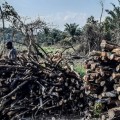
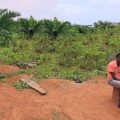 Palm oil plantation expansion: A disturbing alliance between a palm oil company, district officials, and a college school is actively seizing land from farming communities in Buvuma district for their own profit.
Palm oil plantation expansion: A disturbing alliance between a palm oil company, district officials, and a college school is actively seizing land from farming communities in Buvuma district for their own profit.
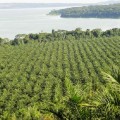 New programme takes over palm oil growing in Uganda
New programme takes over palm oil growing in Uganda
 Palm Oil project investor in Landgrab: Witness Radio petitions Buganda Land Board to save its tenants from being forcefully displaced palm oil plantation.
Palm Oil project investor in Landgrab: Witness Radio petitions Buganda Land Board to save its tenants from being forcefully displaced palm oil plantation.
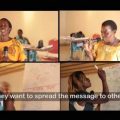 Resisting Oil Palm Plantations in Uganda
Resisting Oil Palm Plantations in Uganda
MEDIA FOR CHANGE NETWORK
Bridging the access to justice gap: Witness Radio trains paralegals ahead of Uganda’s general election.
Published
1 week agoon
May 29, 2025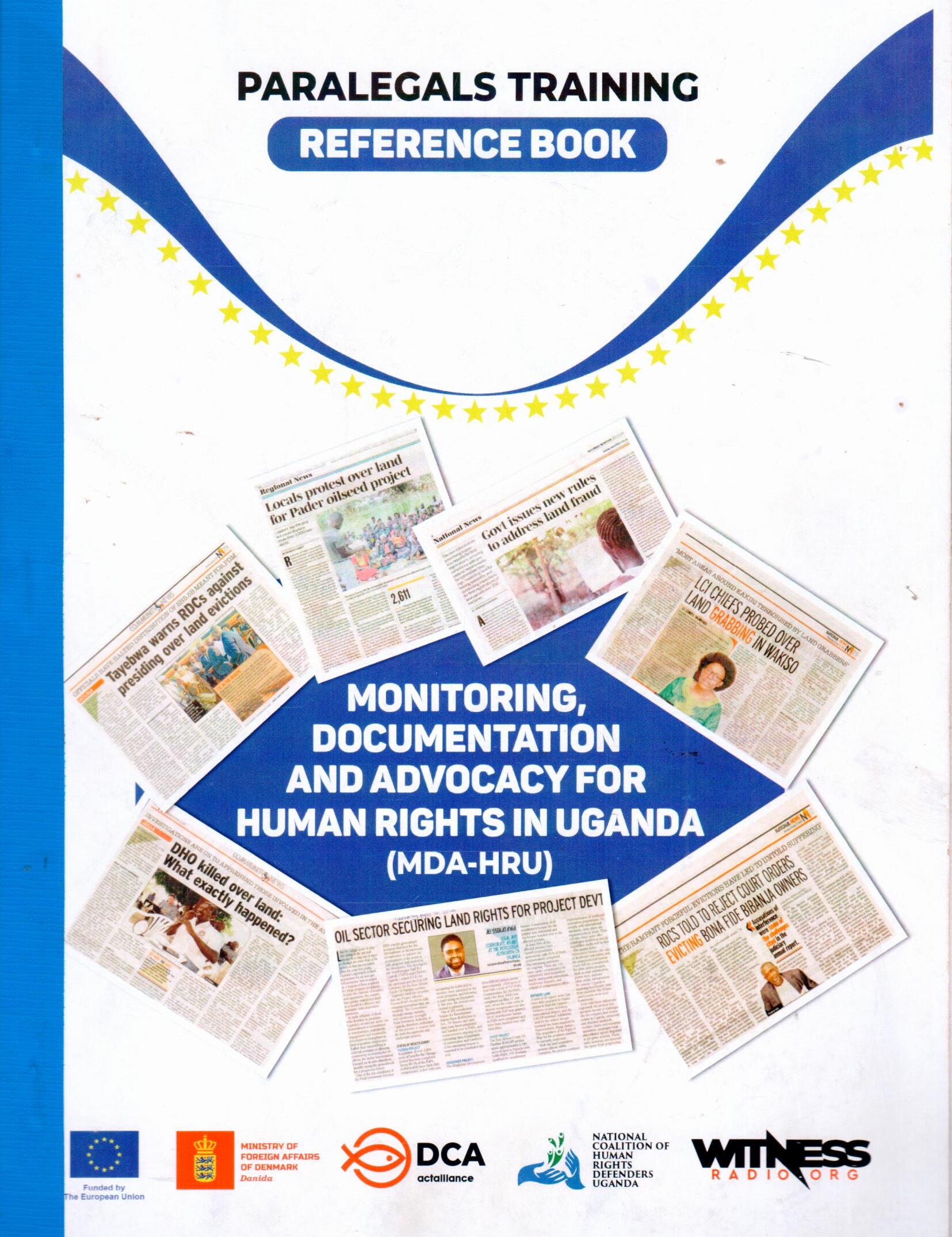
By Witness Radio team.
Kiryandongo, Uganda—Communities across Uganda are currently in the midst of a pressing and severe crisis due to the impacts of land-based investments. These include forced evictions, lack of consultation, and concealed project information. These injustices persist due to a widespread lack of legal awareness and limited access to justice among affected communities.
As Uganda enters the general election period, more farming communities’ land will continue to be forcibly taken from them by multinationals and individual investors, and the number of community land rights and environmental defenders will likely increase. This is because citizen’s liberty is at stake during electoral periods and all justice institutions quite often prioritize electoral justice during this period. Besides, perpetrators of forceful land evictions may use merits of electoral violence to criminalize land and environmental rights defenders in order to silence their activism. Community land rights and environmental defenders work to protect the rights of communities to their land and natural resources. Witness Radio has documented and provided legal representation to dozens of them whose work has been criminalized by wealthy individuals and multinationals.
“We are often evicted from our land without prior consultation, compensation, or meaningful resettlement,” said Benon Beryaija, a community representative from Kiryandongo district. “The evictors tell us they have ultimate power over our land and that we have no right to resist. These evictions happen without following the law.”
Beryaija is among the thousands of people in Kiryandongo whose land was grabbed by a group of multinationals without compensation or resettlement. According to Witness Radio, Agilis Partners Limited is among the multinational companies alongside Kiryandongo Sugar Limited and Great Seasons SMC Limited that have forcibly displaced over 35,000 people to pave the way for large-scale agricultural operations since 2017.
“But all this violence continues because we are ignorant about the law,” Beryaija added. “We don’t know what to do, what to ask for, or how to demand accountability. The companies use this gap to take advantage.”
To address this critical gap in legal knowledge, Witness Radio Uganda, in collaboration with the European Union, Dan Church Aid (DCA), and the National Coalition for Human Rights Defenders in Uganda (NCHRD-U), conducted the first-ever paralegal training for selected community activists against irresponsible Land-Based Investments (LBIs) and Land and Environmental Defenders (LEDs) in the Midwestern Subregion of Uganda. This initiative aims to equip grassroots defenders with basic legal tools to resist human rights violations and abuses as well as land injustices and environmental destruction and to advocate for their communities, instilling a sense of empowerment and hope.
“Community defenders are at the forefront of the fight for land rights and environmental justice and should provide that first-hand legal support, but they often lack the tools to engage with legal systems or resolve disputes effectively. We are currently emphasizing the importance of equipping communities with legal knowledge on land and environmental rights, a clear understanding of what to do when a defender is arbitrarily arrested and detained or disappears, what to do when an investor comes to communities’ land, how to effectively to document human rights violations/abuse, and practical ways to speak to power and hold perpetrators to account for their deeds,” said Mrs. Bulyerali Joan, Witness Radio’s Head of Community Empowerment.
The three-day training, held last week from May 19th to 21st in Uganda’s mid-western region, brought together 20 participants from eviction-prone districts, including Kiryandongo, Hoima, Masindi, Kibale, Kagadi, and Buliisa. This training, which covered key topics, was a significant step in the fight against land evictions, as highlighted in a 2024 Witness Radio report on land evictions. The report, based on extensive research and interviews with affected communities, revealed the alarming rate of land evictions and the urgent need for legal empowerment among these communities.
The training covered key topics, including understanding the criminal justice system and how it operates, how to represent others and oneself in interactions with the police or in court, understanding land and environmental rights, documenting violations, legal processes for seeking redress, community mediation techniques, and how to demand accountability from perpetrators.
“Our goal is to empower them with the legal knowledge necessary to act as first responders in their communities, especially during this upcoming general election, to stop arbitrary arrests and detention, empower communities to push back illegal land evictions, and guide others even without the immediate presence of lawyers or our organization.” Ms. Buryelari added, underlining the crucial role of the paralegals in the upcoming elections.
Oyungi Jovia, one of the Land and Environmental Defenders (LEDs) who participated in the training, described it as impactful and an eye-opener, particularly in addressing pressing community concerns and understanding their role in mitigating harm. The training has not only equipped her with the necessary legal knowledge but also boosted her confidence in supporting those who seek her help.
“We didn’t know the legal processes to follow. Now we know where to start, what documents are required, and how to collect and present evidence in land-related cases,” she shared. “I have learned how to guide community members in legal matters, and now more confident in my ability to support those who come to me for help.”
Before the training, Jovia admitted that she and others often struggled to respond to community concerns due to their limited understanding of the law. “People would come to us for advice, but we barely knew what to tell them. This training has changed everything.” She added.
As land-based conflicts continue to rise in Uganda, particularly in regions targeted by large-scale agribusiness projects, Witness Radio’s paralegal initiative represents a significant step toward community-led access to justice and legal empowerment.
“We are building a network of informed grassroots leaders,” Mrs. Bulyerali emphasized, “who can defend their peers, community land rights, document violations, and help others seek justice, even in the absence of Witness Radio.”
Related posts:

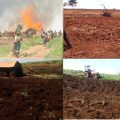 Witness Radio, private companies, CSOs and local government officials are meeting to discuss alternative remedies to salvage the appalling land and environmental rights situation in Kiryandongo district.
Witness Radio, private companies, CSOs and local government officials are meeting to discuss alternative remedies to salvage the appalling land and environmental rights situation in Kiryandongo district.
 Witness Radio Uganda wins the best CSO land rights defenders award at the National Land Forum Awards.
Witness Radio Uganda wins the best CSO land rights defenders award at the National Land Forum Awards.
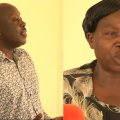 Kiryandongo leadership agree to partner with Witness Radio Uganda to end rampant forced land evictions in the district.
Kiryandongo leadership agree to partner with Witness Radio Uganda to end rampant forced land evictions in the district.
 Local communities lost over 60,000 acres of land to grabbers at a time Witness Radio – Uganda was under a suspension.
Local communities lost over 60,000 acres of land to grabbers at a time Witness Radio – Uganda was under a suspension.

Uganda’s top Lands Ministry official has been arrested and charged with Corruption and Abuse of Office, a significant event that will have far-reaching implications for land governance in the country.

Environmentalists raise red flags over plan to expand oil palm fields in Kalangala

Bridging the access to justice gap: Witness Radio trains paralegals ahead of Uganda’s general election.

Ugandan Communities Say Total’s Oil Project Is More of a Land Grab than a Development Opportunity

EACOP project triggers floods in Kyotera District.

Ugandan activist asks HSBC to put ‘lives before profit’ as campaigners target bank’s AGM

Bridging the access to justice gap: Witness Radio trains paralegals ahead of Uganda’s general election.

A decade of bloodshed: 1,088 Human Rights defenders killed for resisting corporate abuse

Innovative Finance from Canada projects positive impact on local communities.
Over 5000 Indigenous Communities evicted in Kiryandongo District
Petition To Land Inquiry Commission Over Human Rights In Kiryandongo District
Invisible victims of Uganda Land Grabs
Resource Center
- LAND GRABS AT GUNPOINT REPORT IN KIRYANDONGO DISTRICT
- RESEARCH BRIEF -TOURISM POTENTIAL OF GREATER MASAKA -MARCH 2025
- The Mouila Declaration of the Informal Alliance against the Expansion of Industrial Monocultures
- FORCED LAND EVICTIONS IN UGANDA TRENDS RIGHTS OF DEFENDERS IMPACT AND CALL FOR ACTION
- 12 KEY DEMANDS FROM CSOS TO WORLD LEADERS AT THE OPENING OF COP16 IN SAUDI ARABIA
- PRESENDIANTIAL DIRECTIVE BANNING ALL LAND EVICTIONS IN UGANDA
- FROM LAND GRABBERS TO CARBON COWBOYS A NEW SCRAMBLE FOR COMMUNITY LANDS TAKES OFF
- African Faith Leaders Demand Reparations From The Gates Foundation.
Legal Framework
READ BY CATEGORY
Newsletter
Trending
-

 MEDIA FOR CHANGE NETWORK1 week ago
MEDIA FOR CHANGE NETWORK1 week agoBridging the access to justice gap: Witness Radio trains paralegals ahead of Uganda’s general election.
-

 MEDIA FOR CHANGE NETWORK1 week ago
MEDIA FOR CHANGE NETWORK1 week agoA decade of bloodshed: 1,088 Human Rights defenders killed for resisting corporate abuse
-

 MEDIA FOR CHANGE NETWORK1 week ago
MEDIA FOR CHANGE NETWORK1 week agoUgandan Communities Say Total’s Oil Project Is More of a Land Grab than a Development Opportunity
-
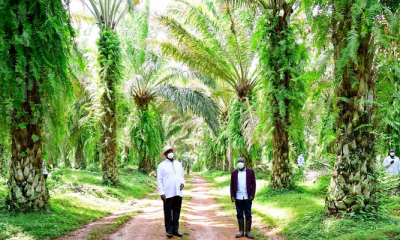
 MEDIA FOR CHANGE NETWORK3 days ago
MEDIA FOR CHANGE NETWORK3 days agoEnvironmentalists raise red flags over plan to expand oil palm fields in Kalangala
-
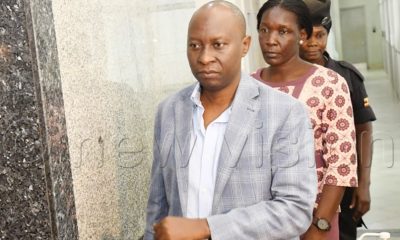
 MEDIA FOR CHANGE NETWORK1 day ago
MEDIA FOR CHANGE NETWORK1 day agoUganda’s top Lands Ministry official has been arrested and charged with Corruption and Abuse of Office, a significant event that will have far-reaching implications for land governance in the country.
